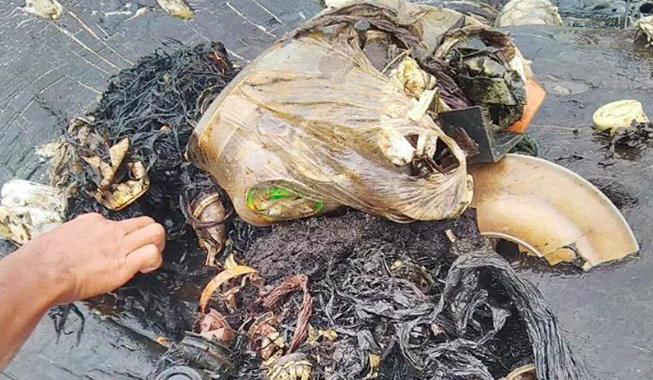A dead sperm whale washed up on a beach in the Wakatobi Islands in Southeast Sulawesi on Sunday, but what was most shocking was what was found inside its body — the latest disturbing illustration of Indonesia’s huge plastic waste problem.
As tweeted by WWF Indonesia, the whale was decaying and had several body parts missing when it washed up on shore. Its cause of death is not yet known.
Sobat, seekor Paus Sperma (Physeter macrocephalus) terdampar di Pulau Kapota, Wakatobi dlm kondisi sdh membusuk (18/11). Kondisi paus saat ditemukan tdk baik & bagian tubuhnya sdh tdk lengkap. Pihak berwenang tdk bisa melakukan nekropsi u/ mengetahui penyebab kematian paus tsb. pic.twitter.com/O1ywAr7hbD
— Yayasan WWF Indonesia (@WWF_ID) November 19, 2018
When local wildlife officials opened up the whale carcass, they found 5.9 kg of plastic waste inside its belly, consisting of 19 pieces of hard plastic (140 g), four plastic bottles (150 g), 25 plastic bags (260 g), a pair of flip flops (270 g), plastic rope (3.26 kg) and 115 plastic cups (750 g).
5,9 kg sampah plastik ditemukan di dlm perut paus malang ini! Sampah plastik yaitu: plastik keras (19 pcs, 140 gr), botol plastik (4 pcs, 150 gr), kantong plastik (25 pcs, 260 gr), sandal jepit (2 pcs, 270 gr), didominasi o/ tali rafia (3,26 kg) & gelas plastik (115 pcs, 750 gr). pic.twitter.com/ZFWZgkbnzu
— WWF-Indonesia (@WWF_ID) November 19, 2018
As reported by Kompas, the whale — which measured 9.5 meters in length — was buried the following Tuesday as the stench from its decaying body was bothering locals. Samples of the carcass were retrieved for a necropsy.
It’s very likely that the plastic waste the whale ingested came from plastic-polluted rivers. A study conducted last year showed that four of Indonesia’s rivers rank among the 20 most polluted in the world in terms of mismanaged plastic waste measured in metric tons. This makes Indonesia the second-largest contributor to marine plastic pollution after China.
A recent research article, published in the journal Nature Communications, estimates that between 1.15 million and 2.41 million tonnes of plastic enters the oceans every year from rivers. Of this, Indonesia is estimated to emit around 200,000 tonnes of plastic from rivers and streams, mainly from Java and Sumatra.




